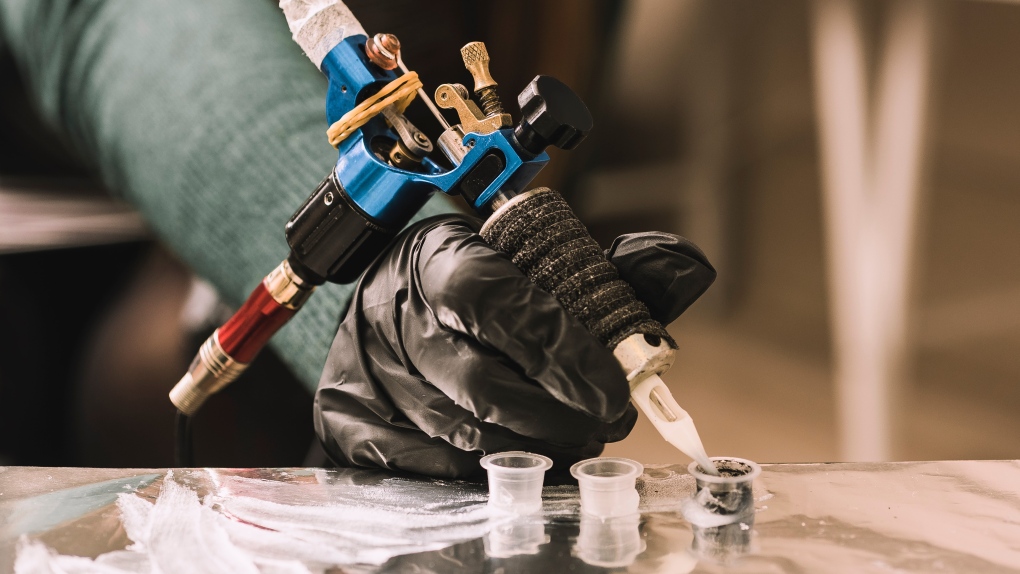Why a B.C. city ended its decades-long ban on tattoo shops
 (shutterstock.com)
(shutterstock.com)
Up until this week, opening a tattoo parlour in the Township of Langley in B.C.’s Fraser Valley was technically illegal.
City council voted on Monday to reverse a decades-old bylaw that banned the practice in the township after one woman came forward with a plan to offer a free cosmetic service for people who have experienced adversity or hair loss due to medical conditions.
Avneet Kaur Chahal, an aesthetician working out of a beauty salon in Aldergrove, wanted to offer procedures called powder ombre brows and nano strokes, which are tiny, semi-permanent eyebrow tattoos that mimic the look of hair strokes to create full, defined brows.
She’s also a trauma therapist, and wanted to combine her passion for helping others with her salon business.
“I realized that there are a lot of folks who have faced adversity or any sort of medical condition who often have a difficult time re-recognizing themselves after those events have occurred,” she told CTV News.
“A new sense of self, a sense of feeling good comes from even just a set of eyebrows.”
When trying to get this idea off the ground, she learned that permanent makeup services fall under the definition of tattoo in the bylaw.
“Today, in 2023, tattoos are just a form of art. So therefore, I really thought it was time for it to go,” Chahal said.
She brought the issue to Coun. Barb Martens, who in turn advocated on her behalf to end the ban at city hall.
Martens told CTV News the bylaw amendment passed 8-1 with little debate on Monday.
She said a number of people already offer cosmetic tattoo services, like what Chahal wants to do, in the township, but now they’re officially operating legitimately.
On the books, the bylaw dates back to 1987, but Martens said the rule is likely much older.
“It goes back to the days when tattoo parlors were associated with nefarious activities and organized crime, gangs and all the rest. You know, obviously, that's probably half a century ago at this point, or a century ago,” she said.
“It has nothing to do with illegal activity at all anymore. I mean, just using the word parlour,” Martens said, adding that she got staff to search if there were any businesses left in the township that were classified by the municipality as ‘parlours.’ There weren’t. “This was the only parlour and that just goes to the how outdated it was.”
As a memento of the old bylaw, Chahal is naming her beauty salon “Spring Parlour.”
“Parlour, I kept that on, because I wanted to pay tribute to the origin, which is we got rid of this bylaw in order for this parlour to exist,” she said.
And the “Spring” part stands for renewal, she added.
How does Chahal feel after the bylaw was changed so she could give the gift of a confidence boost to those who need it?
“I feel so happy. I feel just absolutely thrilled that it’s possible make bigger changes and I’m excited for young entrepreneurs. I'm hoping this is inspirational to others,” she said.
“My ancestors would be proud because I am a first generation individual here and it makes it worth it.”
CTVNews.ca Top Stories

'Terrifying': Manitoba resident speaks on wildfire and evacuation
As a pair of wildfires burn near Flin Flon and The Pas, a number of Manitobans are being told to evacuate their homes.
Steve Buscemi punched in the face while walking in N.Y.C.
Hollywood actor Steve Buscemi has been treated for injuries after being punched in the face while walking in New York City.
Canucks' Zadorov fined $5,000 for post-game crosscheck on Oilers' McDavid
A Vancouver Canucks defenceman has been given the highest possible fine under the NHL's collective bargaining agreement after a scrum broke out at the end of Game 3 against the Edmonton Oilers Sunday night.
DEVELOPING Michael Cohen takes the stand as testimony in Trump hush money case enters 4th week
The star prosecution witness in Donald Trump's hush money trial is set to take the stand Monday with testimony that could help shape the outcome of the first criminal case against an American president.
Air quality advisories issued in 5 provinces, 1 territory
Air quality advisories are in effect across Western Canada as smoky conditions plague some areas, according to the latest forecasts. Here's where.
Jerry Seinfeld speech prompts pro-Palestinian demonstration at U.S. university graduation ceremony
A tiny contingent of Duke University graduates opposed pro-Israel comedian Jerry Seinfeld speaking at their commencement in North Carolina Sunday, with about 30 of the 7,000 students leaving their seats and chanting "free Palestine" amid a mix of boos and cheers.
Just how bad are ultraprocessed foods? Here are 5 things to know
Many foods fall under the category of ultraprocessed foods, depending on their exact ingredients. This type of food has been studied a lot lately, and the results aren’t great.
No refund for travellers who cancelled flight already scrapped by airline: regulator
Four years on, the controversy over whether airlines owed refunds to passengers after cancelling hundreds of thousands of flights during the pandemic continues to simmer, aggravated by a sluggish, opaque complaints process.
opinion Harry and Meghan's Nigerian adventure: Traditional attire to warm welcomes
For her latest column on CTVNews.ca, royal commentator Afua Hagan writes about Prince Harry and Meghan Markle's recent visit to Nigeria, calling it a 'deeply meaningful campaign' that was about aligning their ongoing efforts to foster mental-health awareness and promoting the Invictus Games.































